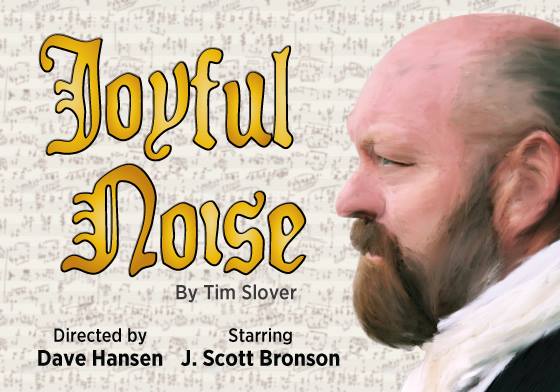PROVO — The Covey Center for the Arts admirably presents this year’s annual holiday tradition of Tim Slover’s uplifting and insightful play, Joyful Noise. This play is a wonderful story of redemption, forgiveness, and is acutely meaningful as Utahns celebrate the Christmas holiday.

Set in London in 1741, Joyful Noise tells the story of George Frideric Handel (played by J. Scott Bronson) and the creation of his masterpiece, The Messiah. Due in part to the recent death of Handel’s greatest patron, Queen Caroline, Handel is suffering from the lack of popularity of his work and lacks endorsement from King George II (Travis Hyer). Handel verbally attacks members of the town, therefore making both himself and his work an unpleasant spectacle. Handel swears off writing music ever again, until he becomes reinvigorated when approached by his collaborator, Charles Jennens (Adam Argyle), who provides the arrangement of scriptural text used in The Messiah. Handel is also touched by the story of a young woman, Susannah Cibber (Julianna Boutler), whose reputation has caused her to become despised by the town. Handel finds distinct parallels in himself, and most strongly in Jesus Christ.
I was most impressed with the strong acting in the production. Slover has created multi-faceted characters, and the actors all did a wonderful job at developing nuanced performances. As Handel, Bronson was able to balance his many moods quite nicely. Bronson showed the audience that underneath Handel’s angry and sometime oblivious exterior, he is truly a sweet old man who is in love with music and feels deeply passionate about his craft. One of my favorite moments was when another character set the scene by saying of Handel, “He’ll hear the music now.” As an audience member, I felt I could actually see Bronson hearing the music, mentally composing the famous oratorio. Bronson was always genuine and believable as Handel, as well as created great chemistry with the other characters.
Boulter and Kat Webb—playing Kitty Clive, who is Cibber’s rival—both were intriguing as the leading female sopranos. Boulter’s honest portrayal of Susannah’s pained emotions was at times heartbreaking and always moving. These moments of sadness and fear were contrasted nicely with joyful ones, in which hope seemed to be the motivation. Webb’s delightfully cunning, manipulative, and snobbish interpretation fit the character perfectly. Webb’s funny and untactful depiction caused her to be the type of enemy audiences love to hate, making her tears toward the end of the play expressive of her true feelings and powerful in its execution. Though all of the actors in the production deserve recognition, I will lastly discuss Lynne D. Bronson as Mary Pendarves. Some of the best moments in the play come from Mary’s clever quips, which Bronson delivers with exact comedic timing. My only complaint with Bronson was that toward the beginning of the play she was speaking rather fast, so much so that it became a distraction. Luckily this seemed to wear off as the play progressed.
Although Joyful Noise contained many strong elements, it is not without flaw. Many of the weaknesses came from the design aspects of the production. Most notable of these was Madeline Plato’s costume design. Indeed, there were many beautiful costumes, but I found some choices distracting, such as the very contemporary style of the opera dress Susannah wears in the first scene. I also felt the hairstyles were not reflective of the period, often due to the absence of the wigs that would most likely have been worn at the time. Though some of these issues may be because of budgeting, I would think that for a period piece that is produced year after year at the same theater, these items should become a priority. Additionally, the set (design by Dan James) appeared to be amateurish, with its wood that did not look smooth or lines that were not straight.
Director David Hanson, for the most part, was able to make good use of the small stage and employed useful tactics, such as the overlap of scenes where two characters were speaking simultaneously or back to back, though not to each other. There were some staging tactics that felt strange, however. One of these moments was when Cibber first sings for Handel, she does not face him. That was odd to me, as she is essentially auditioning for him. I also felt the fight scene between Cibber and Kitty looked fake and cheesy, making it appear comical instead of alarming. The first act did seem to drag a little, but fortunately the energy picked up substantially, and by the end I was quite satisfied with the play’s pacing. What Hanson was able to most wonderfully achieve was the communication of the powerful message of forgiveness and love.
I was most struck, though, by the play’s message of the power of music and theatre to touch the soul. Joyful Noise illustrates the struggle Handel faced to produce The Messiah because of thought that setting the text of the Bible and the life of Christ to music would be sacrilege and offensive. Nevertheless, the power of The Messiah was able to touch the characters and they learn, as I have, that it is through music and theatre that people are often brought closest to sacred things. Joyful Noise succeeded in doing just that, and I was unexpectedly inspired by the Covey’s production. Joyful Noise is perfect for Christmas time, and I would encourage all to spend the time to experience the Covey’s production for yourself.
[box type=”shadow”]Joyful Noise plays Mondays and Thursdays through Saturdays at 7:30 PM through December 3-21 at The Covey Center for the Arts (425 W. Center Street, Provo). Tickets are $12-$14. For more information, visit www.coveycenter.org.[/box]
